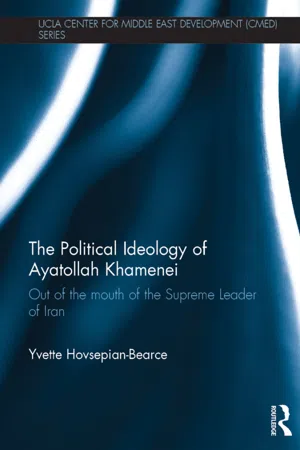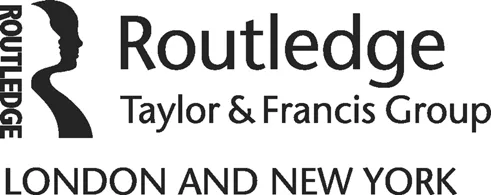
The Political Ideology of Ayatollah Khamenei
Out of the Mouth of the Supreme Leader of Iran
- 382 pages
- English
- ePUB (mobile friendly)
- Available on iOS & Android
The Political Ideology of Ayatollah Khamenei
Out of the Mouth of the Supreme Leader of Iran
About This Book
Ayatollah ?Ali Hosseini Khamenei, Supreme Leader of the Islamic Republic of Iran, is one of the most controversial and influential Muslim leaders in the world today. As Iran's main decision-maker, his theocratic ideology and decisions carry global consequences.
The Political Ideology of Ayatollah Khamenei is the first book to identify and analyze the development and evolution of the theocratic ideology of the Supreme Leader from 1962 to 2014, using his own writings, speeches, and biographies, as well as literature published in the Islamic Republic of Iran. This work provides new insights into Khamenei's political thought and behavior and their impact on Iran's domestic, regional, and international policies. Correlating the development of Khamenei's personality, character, and political behavior with Iran's internal and external challenges, this study explores key issues of the Middle East region, in particular Iran's political posture toward Israel, the United States, and the Muslim world, and the diplomatic crises unfolding over Iran's nuclear development program. This work provides a comprehensive chronological and thematic survey of Khamenei's life.
This book will be of interest to students, scholars, researchers, diplomats, and policymakers focusing on Middle Eastern politics, Iranian affairs, Islamic studies, and international relations; and could serve as an essential resource for those striving to understand Iran's policies toward Israel, the United States, and the Muslim world, as shaped by its supreme autocrat.
Frequently asked questions
Information
- The Struggle over Democracy in the Middle East
Regional politics and external policiesEdited by Nathan J. Brown and Emad El-Din Shahin
- Women in the Middle East and North Africa
Agents of changeEdited by Fatima Sadiqi and Moha Ennaji
- The Israel-Palestine Conflict
Parallel discoursesEdited by Elizabeth Matthews
- Gender and Violence in the Middle East
Edited by Moha Ennaji and Fatima Sadiqi
- Non-State Actors in the Middle East
Factors for peace and democracyGalia Golan and Walid Salem
- Regional Security Dialogue in the Middle East
Changes, challenges and opportunitiesEdited by Chen Kane and Egle Murauskaite
- Israeli Peacemaking Since 1967
Behind the breakthroughs and failureGalia Golan
- Justice and Peace in the Israeli-Palestinian Conflict
Yaacov Bar-Siman-Tov
- The Political Ideology of Ayatollah Khamenei
Out of the mouth of the Supreme Leader of IranYvette Hovsepian-Bearce
The Political Ideology of Ayatollah Khamenei

Contents
- List of illustrations
- Acknowledgments
- Introduction
- PART I The early years
- 1 The rise of Ayatollah Ruhollah Khomeini: The Islamic Revolution and the establishment of the Islamic Republic of Iran
- 2 The political journey of Ayatollah ‘Ali Hosseini Khamenei during the Iranian Revolution, 1962–1979
- 3 The political leadership of Ayatollah Khamenei after the victory of the Islamic Revolution
- 4 President Khamenei, 1981–1989
- 5 Khamenei’s succession to Supreme Leadership
- PART II Supreme Leader Khamenei, 1989–2014
- 6 Khamenei: The leader
- 7 Khamenei: The person
- 8 The struggle over the reconstruction of Iran after Khomeini: President Hashemi Rafsanjani, 1989–1997
- 9 The Iranian reform era and the debate over foreign policy: President Mohammad Khatami, 1997–2005
- 10 The Tehran Spring and the debate over the freedom of the press: President Mohammad Khatami
- 11 Iran’s nuclear era: President Mahmoud Ahmadinejad, 2005–2013
- 12 The era of diplomacy: President Hassan Rouhani, 2013–2014
- PART III Central themes in Ayatollah Khamenei...
Table of contents
- Cover Page
- Half Title Page
- Frontmatter 1
- Title Page
- Copyright Page
- Dedication
- Table of Contents
- List of illustrations
- Acknowledgments
- Introduction
- PART I The early years
- PART II Supreme Leader Khamenei, 1989–2014
- PART III Central themes in Ayatollah Khamenei’s ideology
- Conclusion
- Index